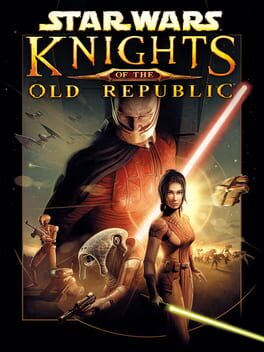Jeremiah
Bio
Nothing here!
Badges

GOTY '23
Participated in the 2023 Game of the Year Event

GOTY '22
Participated in the 2022 Game of the Year Event

Popular
Gained 15+ followers

2 Years of Service
Being part of the Backloggd community for 2 years

Best Friends
Become mutual friends with at least 3 others

N00b
Played 100+ games

Noticed
Gained 3+ followers
Favorite Games
240
Total Games Played
000
Played in 2024
018
Games Backloggd
Recently Reviewed See More
This review contains spoilers
This won't be a surprise to anyone who knows me, but Pentiment has become one of my favourite games. Before you ask, no, It's not just because it's 'medievalesque' (it's early-modern anyway). Pentiment being set in the late-middle ages/early-modern period is certainly what attracted me to the game, but a setting has never been enough to completely win me over. There have been plenty of historical games, over the years, that interested me with their choice of setting, but ultimately disappointed me in their execution. Pentiment is not one of those games.
To say that Pentiment succeeds with its setting is an understatement. The game possesses an unprecedented level of detail, the material culture brilliantly reflects 16th-century Bavaria. It is incredibly well-researched and it shows (the bibliography in the credits is very telling)! Set only in a single town, Tassing, one might think that would be too restrictive to fully explore the historicity. However, quite the opposite is proven to be true. By focusing on a simple, rural, setting, Pentiment was able to take a micro-historical approach and examine what life was like for the average person in an average town. At the same time, Tassing isn't entirely divorced from the wider world either, whether that's by introducing passers-by from outside locations - who relay their experiences from their homeland and journey to Tassing (which is definitely attested) - or through the game's glossary system. The latter is certainly worth praising as I felt that it prevented the dialogue from becoming too heavy. It allowed players to either check the glossary for context mid-conversation, or later on at their own leisure. It never felt forced. One would be forgiven for thinking that you need a history degree as a prerequisite for Pentiment, but even as a historian, myself, I don't think that people unfamiliar with this period would be put at a huge disadvantage. It's something the game acknowledges and accommodates for (this has, so far, been consistent from friends who've played it).
People might accuse the gameplay of being limited, almost entirely, to walking and talking, but I don't that's a bad thing, nor do I necessarily think of that as a fair summary. On the surface, it's not an untrue assessment, but everything about walking around and exploring the town and monastery, having meals with the characters, or even taking part in daily work activities feels purposeful and contributes greatly to further building the world. One of the best interactions in the game was a totally missable lunch event with Brother Sebhat, which deeply explored Christianity in Ethiopia, as well as the very real presence of non-white groups in Europe at this time. Although it's a shame that some players can end up missing this particular moment, the game is filled with plenty of such interactions, each revealing a fascinating aspect of the town, its inhabitants, and, by extension, the setting.
As with anything (even among my top-rated games), nothing is impervious to criticism. To start with, I wasn't totally satisfied with the mystery. Despite ultimately uncovering the mastermind by the end, you never discover who was manipulated to commit the murders the game is set around. Any of the suspects could have plausibly been involved and you never find out whether the people you accused were actually guilty. With that being said, the game diminishes this by making it quite clear early-on that this is intentional, tying into wider themes of change and continuity. History won't wait around for you and Andreas is ultimately not equipped to be an investigator. Even with this time-limit, the process of investigating really gave a sense of the variety of perspectives on what's going on. This is explored much more deeply in Act 3 where, playing Magdalene, you explore the community's cultural memory of the events surrounding the murders that, by this point in the game, passed over the last couple of decades. This returns to my earlier comment about Pentiment's successful and creative worldbuilding without physically removing you from the town.
Another complaint that has arisen is related to the 'choices' provided by the game and the realisation that many of these choices are illusionary. That is to say, as far as the central narrative is concerned, there are no meaningful choices that will drastically affect the conclusion. Similarly to the mystery, this isn't an inherently bad thing. Good illusions are sometimes just as good as the real thing, but I couldn't but feel, at least regarding the choice of suspect to accuse, that it was a shame that it ultimately didn't matter to the ending. This was my initial trail of thought, and I still think that's true, but I've also come to realise that those choices do still matter! Whoever you decide to have executed for their alleged crimes will disappear from the community, and that has an impact. Npcs will pick up on it. Even for something like bringing up a character as a potential suspect to the authorities has consequences because that character finds out and actively dislikes you for putting their life at risk. There are plenty of other choices with shorter-term effects across Pentiment that can bring variety to interactions with the characters. With Andreas, in particular, this is displayed most frequently through the background system, where players can relay offscreen, out-of-town, experiences (chosen beforehand). There's quite a lot to choose from and it's a great way to build Andreas' character in a way that doesn't clog the dialogue with endless exposition. Although, individually, its expressed briefly, it always felt relevant and valuable to what was going on.
A final thing that I would like to touch on is the art. I absolutely love it. Pentiment fully grasps the intricacies of manuscript and woodcut styles, and it's not just for show. The developers masterfully implemented the art style to actively engage with the player in a way that conveys the state of the world and its inhabitants. This is probably the most effective portrayal of change and continuity since players can physically see the periodical transition between the late-middle ages and the early-modern period in the visuals. An example of this is how many of the older townsfolk are clearly depicted in a painted style and, furthermore, are shown to be slowly eroding away over time. This is in stark contrast to some of the other characters, who are shown in the, rough (albeit new), woodblock printing style which is quickly rising as a relatively new technological advancement in the 16th century. I don't often think of the fonts whenever the topic of art arises but, in this case, they also are definitely worth mentioning. With such a great variety between characters, they also actively engage the player to think more widely about the presence (and separation) of different social classes (which is what the fonts represent), which is a theme that becomes much more prevalent in Act 2.
There is a lot more that I could talk about in this review, but I think it's already long enough. I may well add some additional thoughts upon my second playthrough, but for the moment these were the main things that I really wanted to get out there. Even if you haven't rated it as highly as I have (and I admit I've definitely weighed my rating with some obvious bias), I believe that Pentiment has really managed to encapsulate what I've wanted out of gaming and the historical genre for quite some time now. That is, an experience that doesn't just hinge on an attractive setting, but goes lengths to make the world feel alive and real, making use of interesting and important themes that get players thinking and are, in many ways, still relevant to our own world today.
To say that Pentiment succeeds with its setting is an understatement. The game possesses an unprecedented level of detail, the material culture brilliantly reflects 16th-century Bavaria. It is incredibly well-researched and it shows (the bibliography in the credits is very telling)! Set only in a single town, Tassing, one might think that would be too restrictive to fully explore the historicity. However, quite the opposite is proven to be true. By focusing on a simple, rural, setting, Pentiment was able to take a micro-historical approach and examine what life was like for the average person in an average town. At the same time, Tassing isn't entirely divorced from the wider world either, whether that's by introducing passers-by from outside locations - who relay their experiences from their homeland and journey to Tassing (which is definitely attested) - or through the game's glossary system. The latter is certainly worth praising as I felt that it prevented the dialogue from becoming too heavy. It allowed players to either check the glossary for context mid-conversation, or later on at their own leisure. It never felt forced. One would be forgiven for thinking that you need a history degree as a prerequisite for Pentiment, but even as a historian, myself, I don't think that people unfamiliar with this period would be put at a huge disadvantage. It's something the game acknowledges and accommodates for (this has, so far, been consistent from friends who've played it).
People might accuse the gameplay of being limited, almost entirely, to walking and talking, but I don't that's a bad thing, nor do I necessarily think of that as a fair summary. On the surface, it's not an untrue assessment, but everything about walking around and exploring the town and monastery, having meals with the characters, or even taking part in daily work activities feels purposeful and contributes greatly to further building the world. One of the best interactions in the game was a totally missable lunch event with Brother Sebhat, which deeply explored Christianity in Ethiopia, as well as the very real presence of non-white groups in Europe at this time. Although it's a shame that some players can end up missing this particular moment, the game is filled with plenty of such interactions, each revealing a fascinating aspect of the town, its inhabitants, and, by extension, the setting.
As with anything (even among my top-rated games), nothing is impervious to criticism. To start with, I wasn't totally satisfied with the mystery. Despite ultimately uncovering the mastermind by the end, you never discover who was manipulated to commit the murders the game is set around. Any of the suspects could have plausibly been involved and you never find out whether the people you accused were actually guilty. With that being said, the game diminishes this by making it quite clear early-on that this is intentional, tying into wider themes of change and continuity. History won't wait around for you and Andreas is ultimately not equipped to be an investigator. Even with this time-limit, the process of investigating really gave a sense of the variety of perspectives on what's going on. This is explored much more deeply in Act 3 where, playing Magdalene, you explore the community's cultural memory of the events surrounding the murders that, by this point in the game, passed over the last couple of decades. This returns to my earlier comment about Pentiment's successful and creative worldbuilding without physically removing you from the town.
Another complaint that has arisen is related to the 'choices' provided by the game and the realisation that many of these choices are illusionary. That is to say, as far as the central narrative is concerned, there are no meaningful choices that will drastically affect the conclusion. Similarly to the mystery, this isn't an inherently bad thing. Good illusions are sometimes just as good as the real thing, but I couldn't but feel, at least regarding the choice of suspect to accuse, that it was a shame that it ultimately didn't matter to the ending. This was my initial trail of thought, and I still think that's true, but I've also come to realise that those choices do still matter! Whoever you decide to have executed for their alleged crimes will disappear from the community, and that has an impact. Npcs will pick up on it. Even for something like bringing up a character as a potential suspect to the authorities has consequences because that character finds out and actively dislikes you for putting their life at risk. There are plenty of other choices with shorter-term effects across Pentiment that can bring variety to interactions with the characters. With Andreas, in particular, this is displayed most frequently through the background system, where players can relay offscreen, out-of-town, experiences (chosen beforehand). There's quite a lot to choose from and it's a great way to build Andreas' character in a way that doesn't clog the dialogue with endless exposition. Although, individually, its expressed briefly, it always felt relevant and valuable to what was going on.
A final thing that I would like to touch on is the art. I absolutely love it. Pentiment fully grasps the intricacies of manuscript and woodcut styles, and it's not just for show. The developers masterfully implemented the art style to actively engage with the player in a way that conveys the state of the world and its inhabitants. This is probably the most effective portrayal of change and continuity since players can physically see the periodical transition between the late-middle ages and the early-modern period in the visuals. An example of this is how many of the older townsfolk are clearly depicted in a painted style and, furthermore, are shown to be slowly eroding away over time. This is in stark contrast to some of the other characters, who are shown in the, rough (albeit new), woodblock printing style which is quickly rising as a relatively new technological advancement in the 16th century. I don't often think of the fonts whenever the topic of art arises but, in this case, they also are definitely worth mentioning. With such a great variety between characters, they also actively engage the player to think more widely about the presence (and separation) of different social classes (which is what the fonts represent), which is a theme that becomes much more prevalent in Act 2.
There is a lot more that I could talk about in this review, but I think it's already long enough. I may well add some additional thoughts upon my second playthrough, but for the moment these were the main things that I really wanted to get out there. Even if you haven't rated it as highly as I have (and I admit I've definitely weighed my rating with some obvious bias), I believe that Pentiment has really managed to encapsulate what I've wanted out of gaming and the historical genre for quite some time now. That is, an experience that doesn't just hinge on an attractive setting, but goes lengths to make the world feel alive and real, making use of interesting and important themes that get players thinking and are, in many ways, still relevant to our own world today.




